12 Scrape real estate listings You Should Know

In the competitive real estate market, timely access to comprehensive property data is crucial for analysts, investors, and marketers. Manually collecting this information is inefficient and prone to error. The ability to effectively scrape real estate listings provides a strategic advantage, allowing you to gather vast amounts of data on pricing, property features, agent details, and market trends automatically. This process transforms unstructured web data into a structured format, perfect for analysis, lead generation, or populating a database.
This guide provides a detailed walkthrough of the best tools and platforms available for this task. We will explore everything from powerful APIs like Zillow and ATTOM Data Solutions to flexible open-source frameworks such as Scrapy. Each resource listed includes practical use cases, implementation notes, and an honest assessment of its capabilities to help you select the right solution for your specific project.
Our primary focus will be a step-by-step tutorial on using PandaExtract, a powerful yet user-friendly browser extension. We will cover how to install the tool, configure it to capture specific data points from real estate websites, and export the structured results. By the end of this article, you will have a clear understanding of how to scrape real estate listings efficiently, empowering your data-driven decisions.
1. PandaExtract - Ultimate Web Scraper
PandaExtract stands out as a premier no-code solution for professionals who need to scrape real estate listings without writing a single line of code. Its intuitive Chrome extension design allows users to simply navigate to a real estate portal like Zillow or Realtor.com, activate the tool, and click on the data fields they wish to extract. This streamlined process democratizes data collection, making it accessible for real estate analysts, brokers, and investors who require timely market data but lack a technical background.
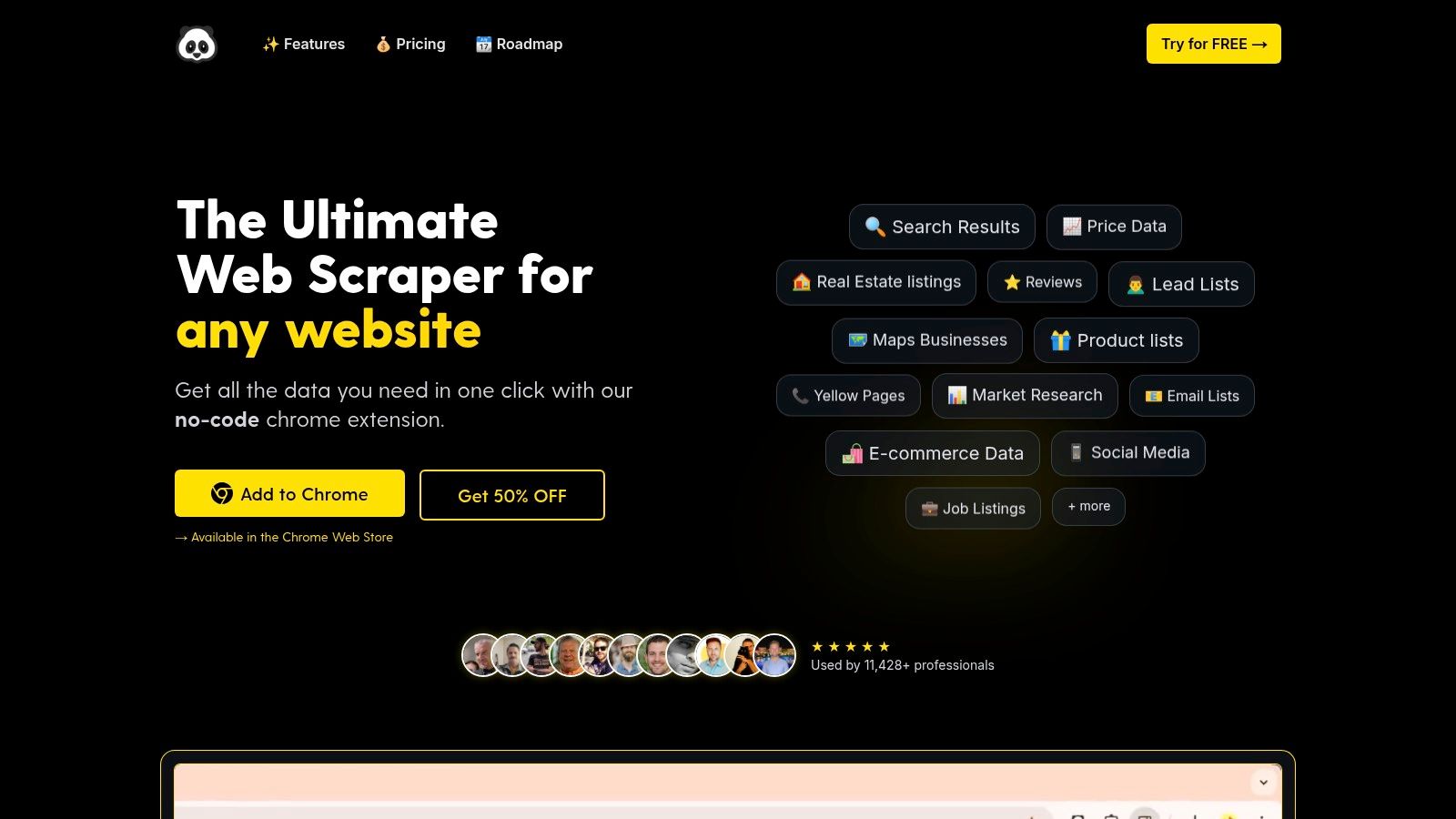
The platform’s strength lies in its powerful bulk extraction and data handling capabilities. Users can process hundreds of property listing URLs at once by uploading a CSV file, enabling large-scale data aggregation for comprehensive market analysis. Its intelligent engine automatically handles pagination, so you can capture every listing across multiple pages with a single setup. For a deeper dive into its capabilities, you can explore detailed guides on their blog, including this post about their website data scraper.
Key Features for Real Estate Scraping
- Point-and-Click Interface: Effortlessly select property details like price, address, square footage, and number of bedrooms directly from the webpage.
- Bulk URL Processing: Scrape data from a list of specific property URLs to gather targeted information for your analysis.
- Automated Pagination: Seamlessly navigate through search result pages to compile a complete list of available properties in a given area.
- Integrated Data Management: View, clean, and organize the extracted data within a built-in spreadsheet before exporting to CSV, Excel, or Google Sheets.
This robust feature set makes PandaExtract an exceptional tool for anyone looking to scrape real estate listings efficiently. It simplifies complex tasks, from competitor price tracking to building a database of investment properties.
Our Take: For its sheer ease of use combined with powerful bulk processing, PandaExtract is our top recommendation. It effectively bridges the gap between manual data entry and complex coding, offering a professional-grade tool that delivers immediate results. You can download the Chrome extension and start with their free trial.
2. ATTOM Data Solutions
ATTOM Data Solutions is a heavyweight in the real estate data industry, offering access to a massive database covering 99% of the U.S. population. Unlike public-facing listing sites, ATTOM provides raw, detailed data for over 155 million properties, making it an indispensable resource for deep market analysis, investment modeling, and large-scale lead generation. This platform is not for casual browsing but for professionals who need comprehensive data that goes far beyond what typical listing sites offer.
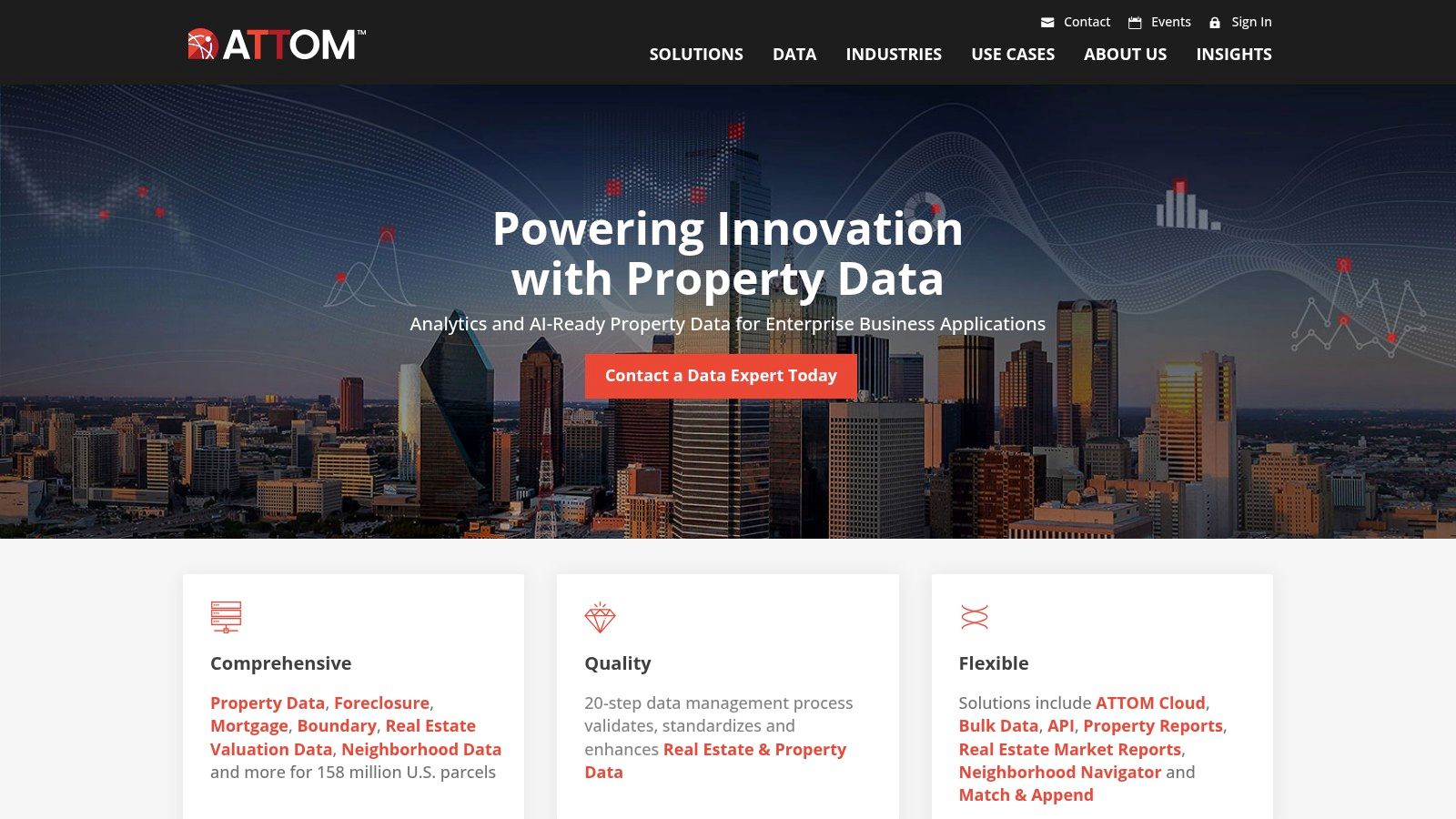
While you wouldn't directly "scrape" ATTOM's front-end website in the traditional sense, their API is the key to legally and efficiently accessing this data. They offer over 9,000 data points per property, including intricate details on property tax, deeds, mortgages, and foreclosure history.
Access and Use Case
ATTOM's data is accessible via API or bulk data licensing, tailored for developers and data science teams.
- Pros: Exceptionally comprehensive and granular datasets, multiple access methods for different technical needs.
- Cons: Pricing is not public and requires direct contact with their sales team, which can be a barrier for smaller operations.
For users needing to scrape real estate listings from public sites before enriching that data, a tool like the PandaExtract Chrome extension can gather the initial information. You can download our Chrome extension to get started, and then use ATTOM's API to add deeper layers of ownership and financial history to your collected listings.
Website: https://www.attomdata.com/
3. Zillow API
As one of the most recognized names in real estate, Zillow provides an API that grants programmatic access to a fraction of its vast database on over 100 million U.S. homes. This makes it an excellent resource for developers, researchers, and small-scale projects needing trusted property data. The API is geared towards enriching applications with details like property attributes, Zestimates, and neighborhood statistics, rather than direct, large-scale scraping.

While the Zillow API provides programmatic access, many professionals still rely on the front-end platform for their daily operations. To better contextualize the data you access, it's insightful to learn more about understanding how professionals use Zillow listings in their property management and sales workflows. This knowledge can help you leverage the API data more effectively.
Access and Use Case
Zillow's API access requires registration to obtain an API key (ZWSID), which is used to authenticate requests.
- Pros: Access to data from a highly reputable source, free for non-commercial use, includes unique data points like the Zestimate.
- Cons: Certain datasets are restricted and require an invitation, strict usage limits apply, and commercial use requires special partnership agreements.
For those looking to scrape real estate listings that are publicly visible on Zillow's front end, a dedicated tool like the PandaExtract Chrome extension is a more direct approach. You can capture listing details efficiently and then, if needed, use the Zillow API to supplement that data with deeper property history or valuation estimates.
Website: https://www.zillowgroup.com/
4. Estated API
Estated API offers a developer-friendly solution for accessing deep property data on over 140 million U.S. properties. Rather than focusing on active listings, Estated provides comprehensive off-market data, including structural details, parcel information, tax assessments, and sales history. This makes it an ideal tool for enriching existing datasets, verifying property information, or building applications that require a robust foundation of property intelligence.
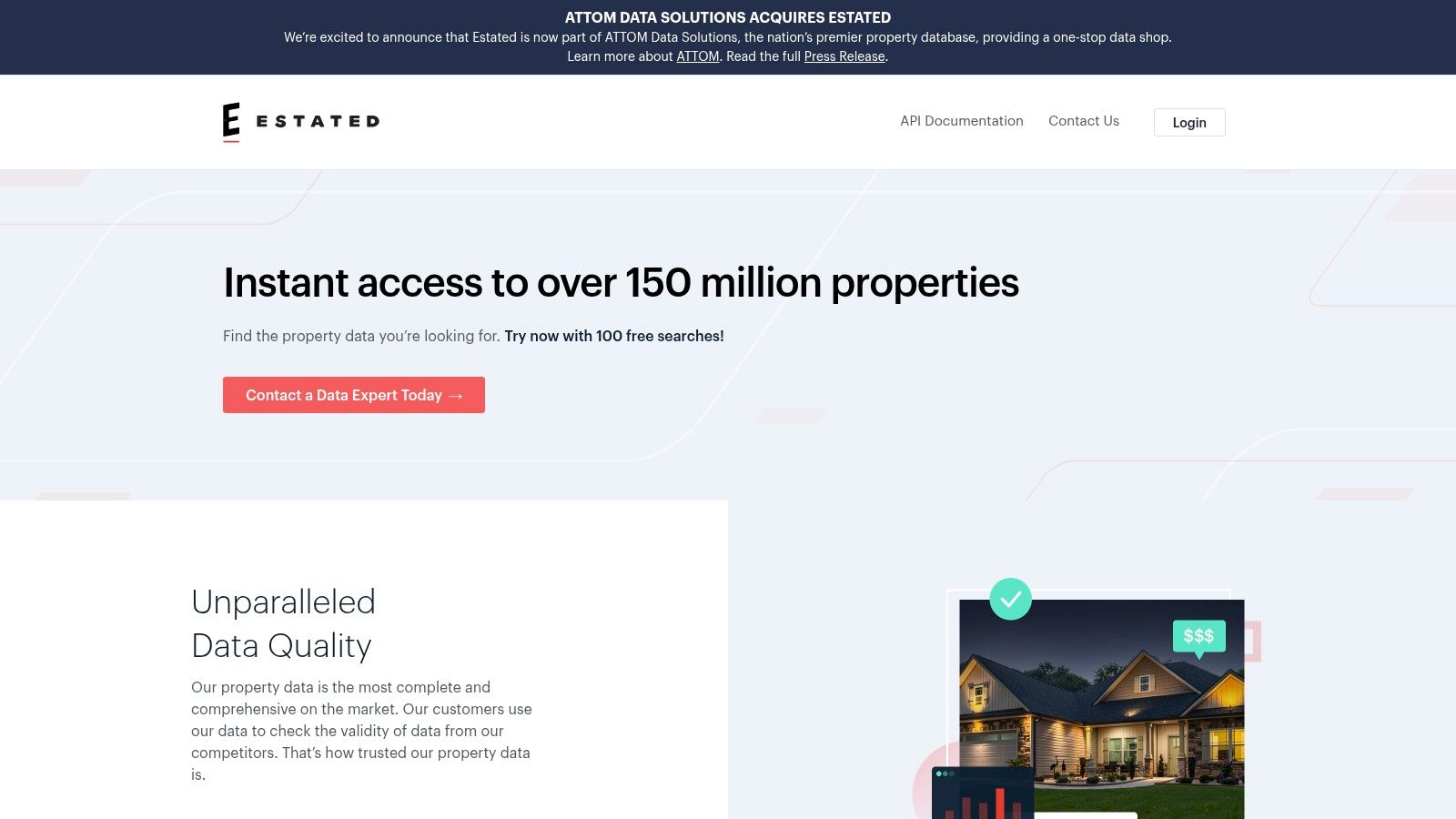
The platform is known for its quick and easy API integration, which appeals to teams that need to get up and running without a lengthy setup process. Estated’s transparent pricing plans, which include a tier with free records, make it accessible for projects of all sizes, from individual developers to enterprise-level operations.
Access and Use Case
Estated is an API-first service designed for seamless integration into existing workflows and applications.
- Pros: User-friendly integration with clear documentation, comprehensive property data, and flexible pricing plans.
- Cons: Free records are limited, so scaling up for larger projects requires a move to a paid subscription.
For those looking to scrape real estate listings from a public site first, you can use the PandaExtract Chrome extension to gather the initial data. Then, you can feed those addresses into Estated’s API to append crucial off-market details. You can see how this works in our guide on how to extract Realtor.com property listings and enrich them.
Website: https://estated.com/
5. RentCast API
RentCast offers a specialized API focused squarely on the rental market, providing a powerful toolkit for investors, property managers, and analysts. It moves beyond standard sales listings to deliver detailed rental valuations, active rental comps, property records, and market trends across the United States. For those who need to scrape real estate listings with a specific focus on rental income and investment potential, RentCast provides the necessary data layer.
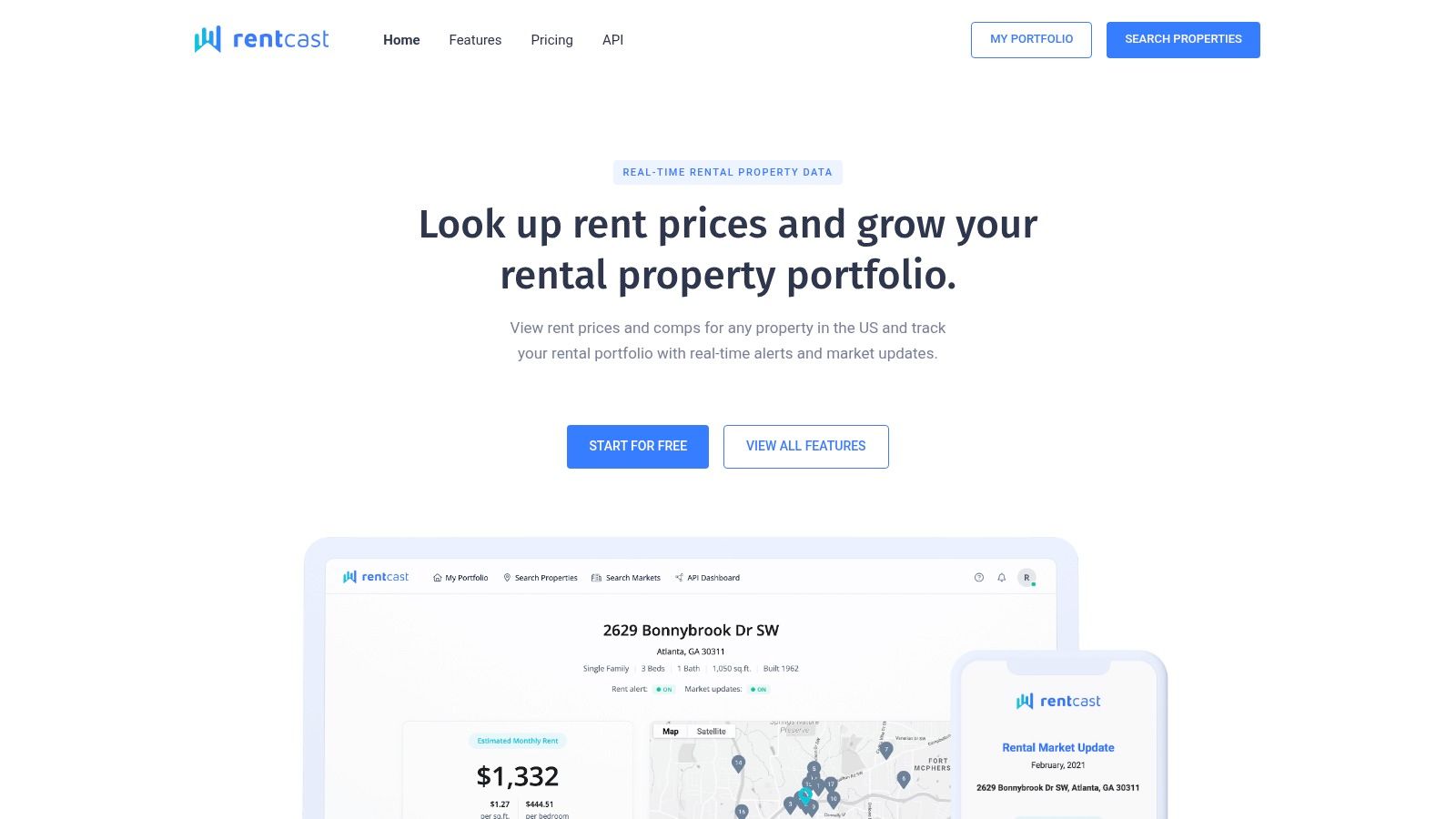
This platform is not a front-end website for browsing but a dedicated API for developers and data professionals. Its unique strength lies in its rental-centric data points, such as AVMs for rent estimates, which are often hard to find or inconsistent on public listing sites. This makes it an excellent resource for enriching data scraped from other sources.
Access and Use Case
RentCast's data is accessible via its API, with clear documentation and a flexible pricing model that includes a free tier, making it highly approachable for smaller projects or initial testing.
- Pros: Highly specialized rental market data, flexible pricing including a free tier for up to 50 API calls per month, and straightforward API integration.
- Cons: The free plan is quite limited, and the data is concentrated on the U.S. rental market, which may not suit users with broader international needs.
For an efficient workflow, you could use a tool like the PandaExtract Chrome extension to quickly gather initial property details from a public site. You can then feed those addresses into the RentCast API to append accurate rental valuations and market data to your dataset. Download our Chrome extension here to try it yourself.
Website: https://www.rentcast.io/
6. CoreLogic API
CoreLogic stands as another enterprise-grade pillar in the real estate data landscape, offering a suite of APIs for professionals who require deeply integrated, reliable property data. Much like its main competitors, CoreLogic provides comprehensive data and analytics that go far beyond standard listings, incorporating property characteristics, ownership details, and market trends. It is a powerful tool for businesses needing to build proprietary platforms or enrich their existing applications with authoritative real estate intelligence.

The platform is built around API access, delivering real-time property data updates and AI-powered insights directly into your business systems. This makes it a scalable and secure option for large-scale operations rather than a tool for one-off scraping tasks. Its user-friendly integration using standard protocols simplifies the development process for technical teams.
Access and Use Case
CoreLogic’s data is accessed through its well-documented API, designed for scalable and secure business integration.
- Pros: Scalable and secure API design, rich analytics, extensive historical data, and customizable solutions.
- Cons: Pricing is not transparent and requires direct sales contact, making it less accessible for small-scale users or individuals.
For those looking to scrape real estate listings from public websites first, a tool like the PandaExtract Chrome extension is ideal for initial data collection. Download the extension here and then leverage the CoreLogic API to append layers of detailed analytics and verified property data to those scraped records, creating a much richer dataset for analysis.
Website: https://www.corelogic.com/
7. RealEstateAPI
RealEstateAPI is a developer-focused platform designed to streamline the creation of real estate applications and analytical tools. It provides a suite of APIs that deliver real-time property listings, neighborhood data, parcel boundaries, and more, directly from official sources. This service is engineered for those who need reliable, structured data to power their own software or conduct in-depth market analysis, rather than for casual property browsing.
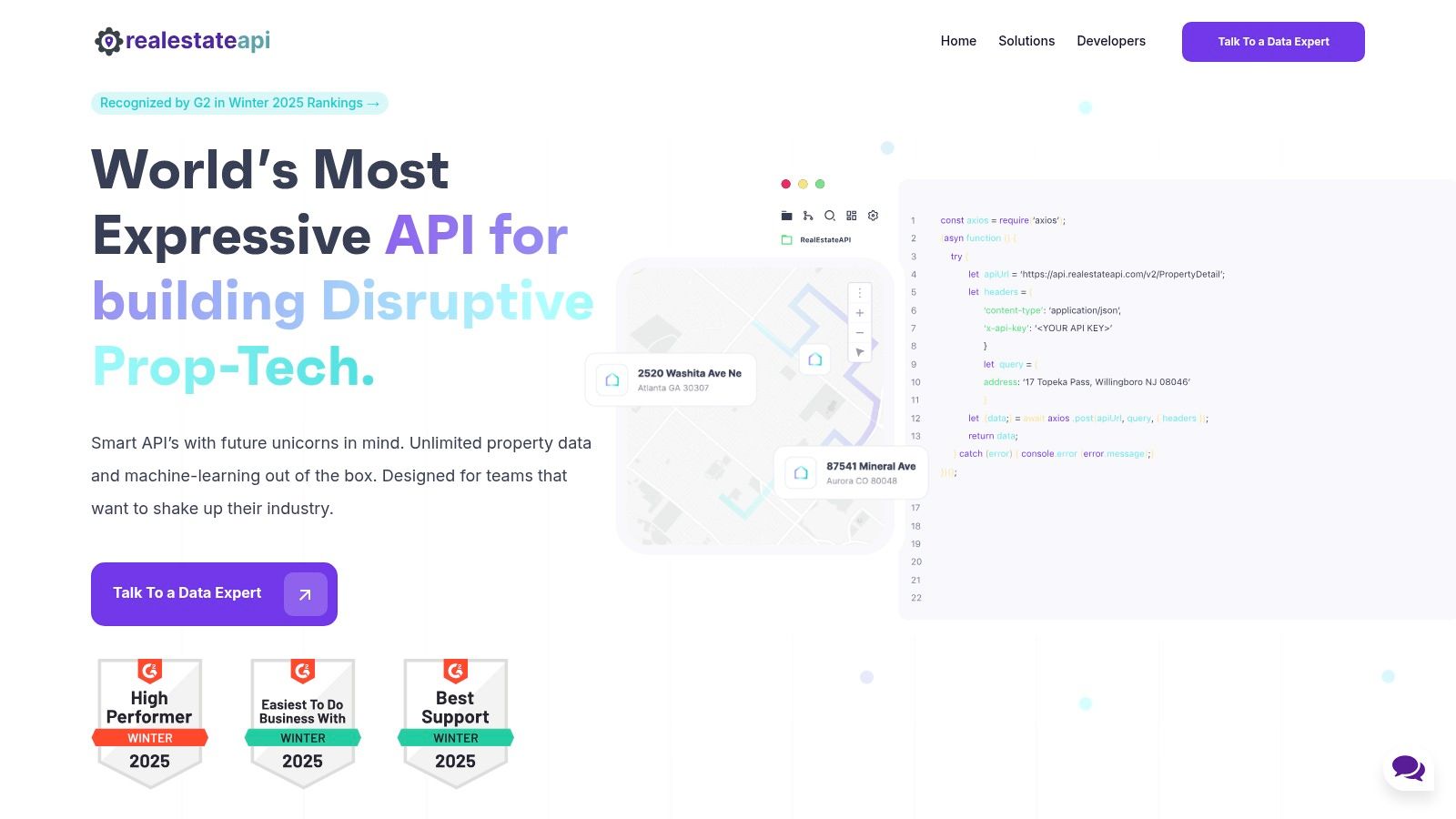
The platform stands out with its well-documented APIs and emphasis on ease of integration. It offers specific endpoints for property searches, detailed property records, and even parcel boundary data in GEOJSON format, which is invaluable for geospatial analysis. This makes it a powerful alternative to manually trying to scrape real estate listings from disparate public websites.
Access and Use Case
RealEstateAPI is accessed through its various API endpoints, requiring technical integration. This makes it ideal for software developers, data scientists, and businesses building custom real estate solutions.
- Pros: Offers comprehensive and cleanly structured data feeds, strong developer support and documentation.
- Cons: Pricing is not public and requires direct contact, which can be a hurdle for individual developers or small teams.
For a powerful workflow, you can use a tool like the PandaExtract Chrome extension to quickly gather initial listing URLs or addresses from a public site. You can download our free Chrome extension and feed this data into the RealEstateAPI to enrich it with official records, parcel data, and historical trends for a much deeper analysis.
Website: https://www.realestateapi.com/
8. ZenRows
ZenRows specializes in providing a robust web scraping API and a suite of tools designed to handle the complexities of modern websites, including real estate portals. It acts as an all-in-one solution that manages proxies, CAPTCHAs, and anti-bot systems automatically, allowing developers to focus purely on data extraction logic. This makes it an excellent choice for those who need to scrape real estate listings from popular but heavily protected sites like Zillow without building an entire anti-blocking infrastructure from scratch.
The platform is built for developers who require reliable, large-scale data collection. By routing requests through its smart proxy network, ZenRows ensures a high success rate, delivering the raw HTML of the target page so you can parse it with your preferred library, such as BeautifulSoup or Cheerio. It essentially takes the most difficult parts of web scraping off your hands.
Access and Use Case
ZenRows is accessed via its API, making it a powerful backend for custom scraping applications.
- Pros: Excellent at bypassing common anti-scraping measures, provides structured data output, and offers a free trial to test its capabilities.
- Cons: Pricing requires direct contact for enterprise plans, and it's a developer-focused tool that demands some coding knowledge to implement.
For those wanting a no-code alternative, the PandaExtract Chrome extension offers a simpler way to grab initial data directly from your browser. You can then use a service like ZenRows if you need to scale up your collection efforts to a more programmatic and automated level.
Website: https://www.zenrows.com/
9. Scrapy
For developers and technical teams needing maximum control and scalability, Scrapy is the go-to open-source Python framework. It is not a simple tool but a powerful environment for building custom web crawlers, often called "spiders," that can navigate and scrape real estate listings from virtually any website. Scrapy is designed for complex, large-scale projects where off-the-shelf tools might fall short, giving you complete power over the data extraction logic, request handling, and data processing pipeline.
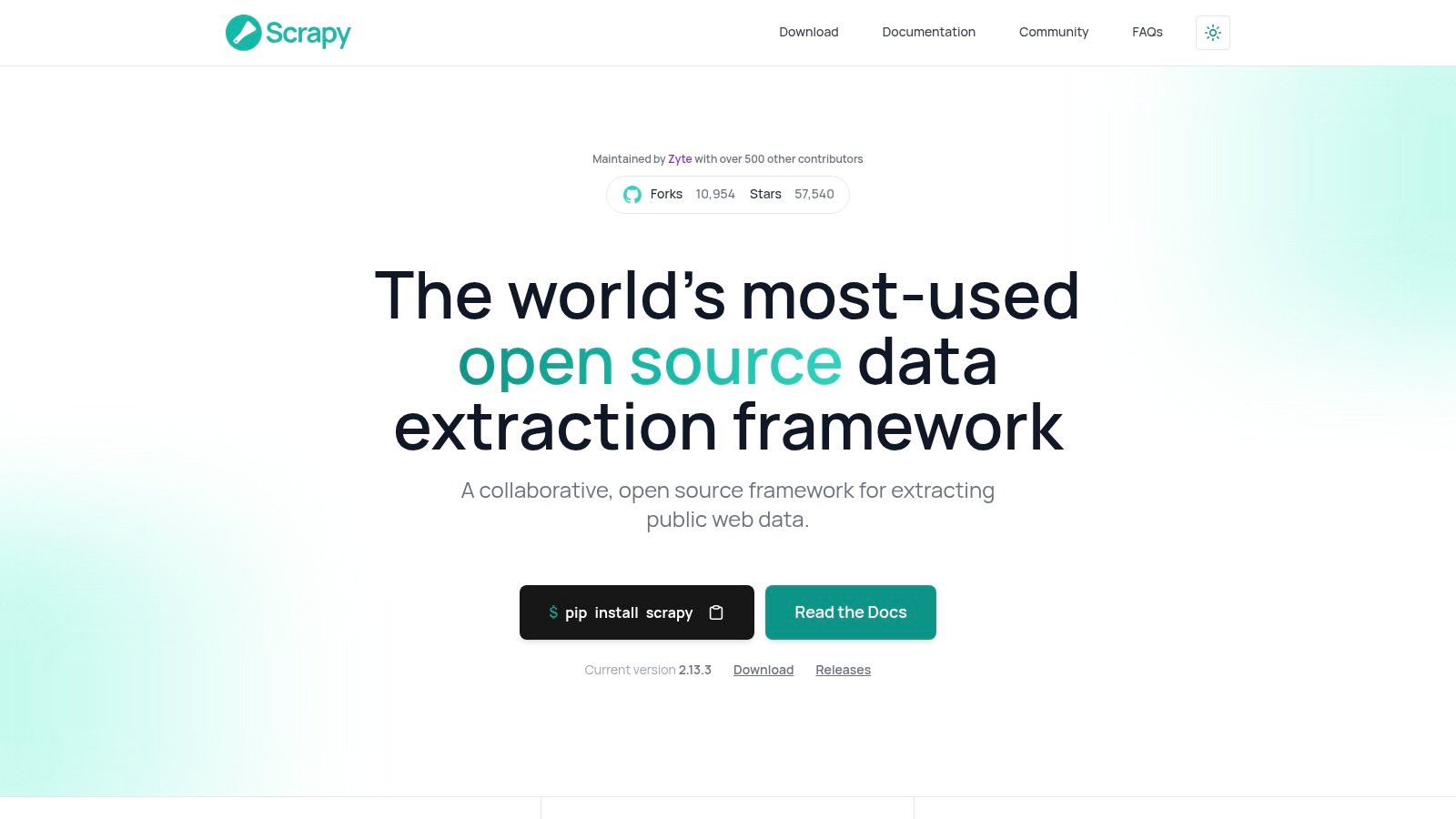
This framework is built to be extensible and asynchronous, meaning it can handle many web requests concurrently for high efficiency. You can program your spiders to follow links, handle logins, and extract specific data fields from HTML, making it perfect for creating a bespoke scraper for sites like Zillow or Realtor.com. While it offers unparalleled flexibility, it comes with a steep learning curve.
Access and Use Case
Scrapy is a free-to-use framework installed via Python's package manager. It is best suited for data engineers and developers with Python programming experience.
- Pros: Completely free and open-source, highly customizable and scalable for large projects, supported by extensive documentation and a large community.
- Cons: Requires significant programming knowledge, and users must manage proxies, headers, and legal compliance themselves.
For those who need to quickly scrape real estate listings without coding, the PandaExtract Chrome extension is a great starting point. For deeper dives and more complex projects, you can explore other powerful web scraping tools to complement your workflow.
Website: https://scrapy.org/
10. PropertyShark
PropertyShark is a powerful real estate database that shines in providing deep property intelligence, particularly in New York and other major U.S. metropolitan areas. It goes beyond standard listings by offering comprehensive reports that include building details, ownership information, sales history, comparables, and foreclosure data. This makes it an essential tool for investors, developers, and brokers who need to perform in-depth due diligence on specific properties rather than just browsing active listings.
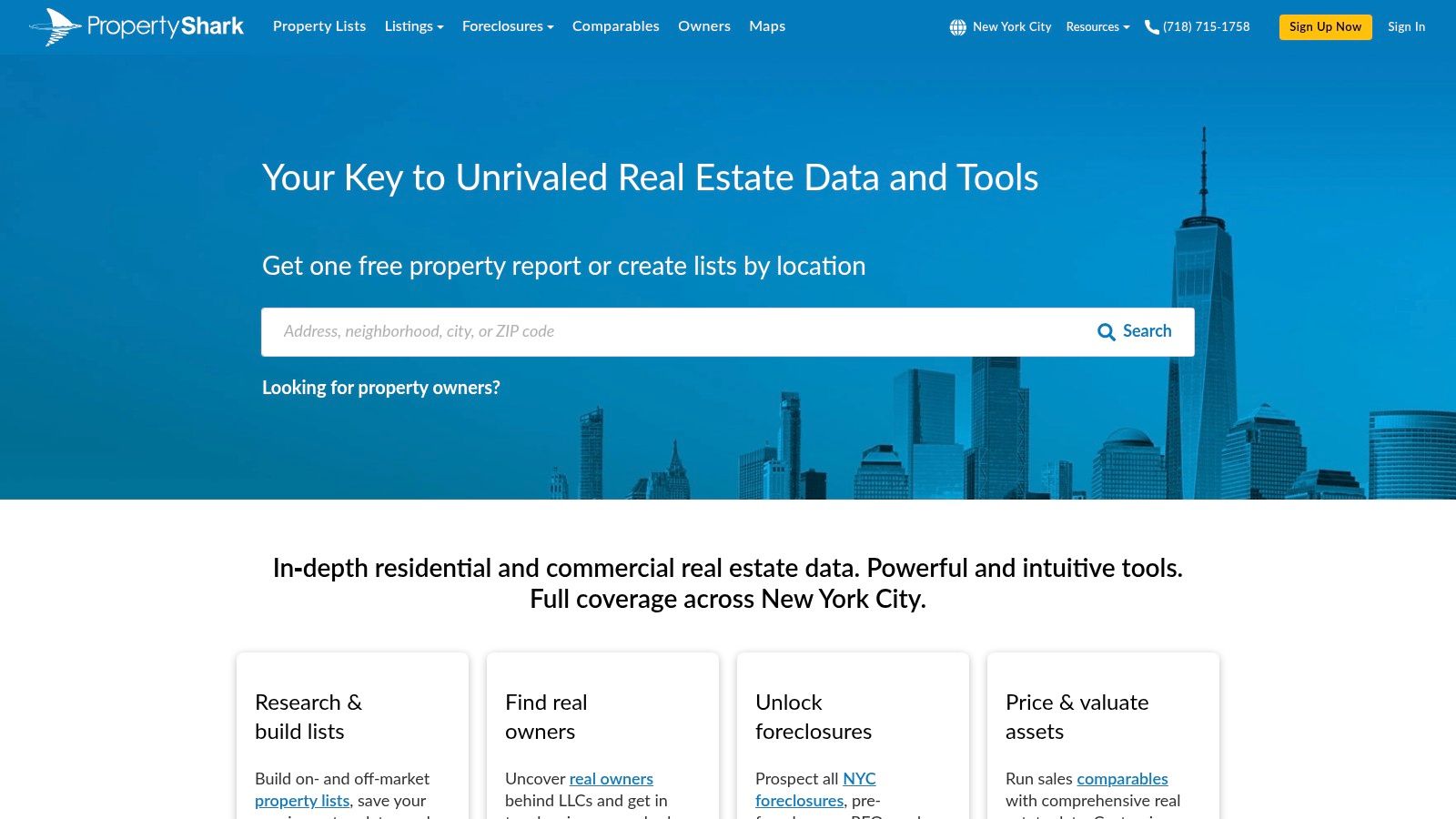
While the platform is designed for research, not direct scraping, the valuable data it presents can be a prime target. Manually collecting this information is tedious, which is where automation becomes beneficial for analysts looking to scrape real estate listings and their associated ownership details for market analysis. Its focus on detailed property records distinguishes it from broader, public-facing listing portals.
Access and Use Case
PropertyShark's detailed reports are primarily available through a subscription model, with limited information available for free.
- Pros: Extremely detailed property reports, strong focus on key U.S. markets, user-friendly interface for research.
- Cons: Most valuable data is behind a paywall, limited free access, not designed for bulk data extraction.
For users needing to extract specific data points from a set of PropertyShark reports, the PandaExtract Chrome extension can be a valuable tool. After navigating to your target properties, you can download our free Chrome extension and use it to pull specific ownership or financial data into a structured format, saving significant time on manual data entry.
Website: https://www.propertyshark.com/
11. RealtyTrac
RealtyTrac is a specialized online marketplace focused on foreclosed and defaulted properties across the United States. For investors and analysts targeting distressed assets, this platform is a goldmine, offering extensive listings that are often difficult to find on mainstream real estate sites. It provides detailed property information, including foreclosure status, auction dates, and property values, making it a critical resource for this niche market segment.
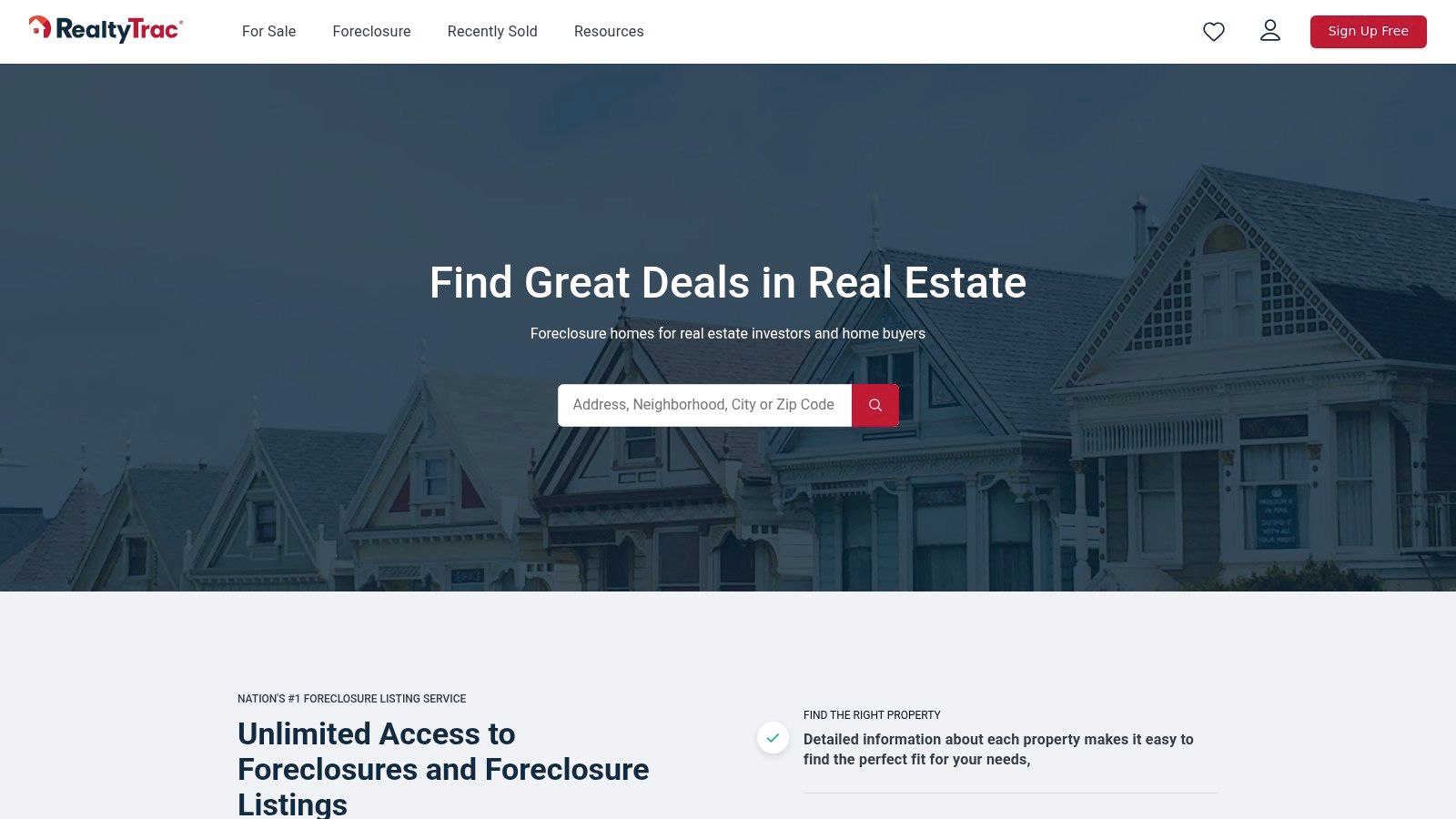
While the platform offers a robust search interface, extracting this valuable data at scale requires a dedicated tool. Users looking to scrape real estate listings from RealtyTrac can capture specific property details for deeper analysis, trend tracking, or building a proprietary database of distressed properties. The data is regularly updated, ensuring the information you gather is timely and relevant for making quick investment decisions.
Access and Use Case
Full access to RealtyTrac's detailed data is behind a subscription paywall, which is a key consideration for users.
- Pros: Highly focused and comprehensive data on foreclosures, regularly updated listings for timely opportunities.
- Cons: Requires a paid monthly subscription to access full details, and pricing is not publicly disclosed.
To efficiently extract data from their platform, a tool like the PandaExtract Chrome extension allows you to select and download listing details directly from your search results into a structured format like a CSV or XLSX file for further market analysis.
Website: https://www.realtytrac.com/
12. RealMassive
RealMassive positions itself as a modern, transparent marketplace for commercial real estate (CRE). It provides a free-to-list and free-to-search platform, which is a significant departure from many of its fee-based competitors in the commercial space. This accessibility makes it an attractive target for those looking to gather data on office, industrial, and retail properties across the United States.
RealMassive's strength lies in its real-time market data, covering an extensive inventory of commercial spaces. While the platform itself is user-friendly for manual searches, extracting this information at scale for market analysis or lead generation requires a more robust approach. This is a prime scenario where you would scrape real estate listings to build a custom dataset of commercial availabilities.
Access and Use Case
The platform is open for public browsing, making its front-end data accessible for scraping.
- Pros: Free access to a vast database of commercial property listings, focus on real-time and accurate data.
- Cons: Exclusively focused on commercial real estate, so it's not suitable for residential data needs.
For users building a commercial real estate database, the PandaExtract Chrome extension can be used to methodically capture listing details such as price, square footage, and property type directly from the site. This allows you to compile proprietary market intelligence without relying on costly data subscriptions, perfect for brokers or analysts tracking specific submarkets. Download the free Chrome extension to get started.
Website: https://www.realmassive.com/
Top 12 Real Estate Listing Scraping Tools Comparison
| Product | Core Features/Characteristics | User Experience / Quality ★ | Value Proposition 💰 | Target Audience 👥 | Unique Selling Points ✨ |
|---|---|---|---|---|---|
| 🏆 PandaExtract - Ultimate Web Scraper | No-code hover-click extraction, bulk URL processing, email & image harvesting, spreadsheet editor | ★★★★★ Trusted by 11,400+ users | Free trial + 50% off; no coding needed | Market researchers, marketers, e-commerce, journalists | Intuitive UI, multi-source, cloud scheduling |
| ATTOM Data Solutions | 9,000+ data points/property, nationwide real estate data API | ★★★★ Large datasets | Contact for pricing | Real estate analysts, enterprises | Extensive property & risk data |
| Zillow API | Home valuations (Zestimate), detailed property & neighborhood info | ★★★★ Well-known platform | Free non-commercial use | Developers, researchers | Popular, free access for limited use |
| Estated API | Easy API integration, detailed property & sales data | ★★★★ User-friendly | Multiple plans, free records | Developers, real estate businesses | Quick API, free tier |
| RentCast API | Rental property focus, listing & valuation data | ★★★★ Flexible pricing | Free tier, pay as volume grows | Rental market analysts, landlords | Rental-specific, free API calls |
| CoreLogic API | Real-time updates, AI analytics, scalable integration | ★★★★ Enterprise-ready | Contact for pricing | Enterprises, data analysts | AI-powered insights, historical data |
| RealEstateAPI | Real-time listings, parcel boundaries, bulk data | ★★★★ Developer-oriented | Contact for pricing | Developers, real estate firms | Bulk processing, GEO JSON data |
| ZenRows | Automated real estate scraping from Zillow, filtering | ★★★★ Efficient automation | Contact for pricing | Researchers, data collectors | Automated scraping, structured outputs |
| Scrapy | Open-source Python scraping framework | ★★★★ Free, flexible | Free | Developers, programmers | Complete control, open source |
| PropertyShark | Property reports, ownership, foreclosure data | ★★★★ User-friendly | Paid subscription needed | Property researchers, investors | Focus on key US markets |
| RealtyTrac | Foreclosure listings, market trends | ★★★★ Up-to-date data | Subscription required | Foreclosure specialists | Foreclosure focus, market insights |
| RealMassive | Commercial real estate listings, market analytics | ★★★★ Free access | Mostly free; extra services cost | Commercial real estate professionals | Large-scale commercial property data |
Final Thoughts
Navigating the landscape of real estate data extraction can feel complex, but as we've demonstrated, the right tools transform this challenge into a significant strategic advantage. From dedicated APIs to powerful browser extensions and custom-built frameworks, the options available empower professionals across various industries to gather, analyze, and act on property information with unprecedented speed and precision.
The core takeaway is that your specific objective should dictate your choice of tool. There is no single "best" solution for everyone; the ideal approach depends entirely on your technical skill, project scale, budget, and the specific data points you need.
Key Insights Summarized
Throughout this guide, we've explored a diverse range of solutions designed to scrape real estate listings. A crucial theme that emerged is the trade-off between ease of use and customization.
- For Immediate, No-Code Results: Tools like PandaExtract are invaluable. They offer a visual, point-and-click interface that allows anyone, regardless of technical background, to start collecting structured data from websites like Zillow or Realtor.com within minutes. This path is ideal for market researchers, lead generation specialists, and small-scale brokers who need data quickly without a development team.
- For Enterprise-Grade, Structured Data: APIs from providers like ATTOM Data Solutions, CoreLogic, and Estated are the gold standard. They deliver highly structured, reliable, and comprehensive datasets directly into your applications. This approach is best suited for large enterprises, data analytics firms, and financial institutions that require deep, historical data and can manage API integrations.
- For Custom, Large-Scale Scraping: A framework like Scrapy, paired with a proxy service like ZenRows, offers unparalleled power and flexibility. This is the domain of developers and data scientists who need to build bespoke crawlers for unique data sources or large-scale, ongoing extraction projects where control and scalability are paramount.
Actionable Next Steps and Final Considerations
Before you commit to a tool, take a moment to define your project's scope clearly. Ask yourself these critical questions:
- What is my primary goal? Am I tracking competitor pricing, generating leads, performing market analysis, or feeding a predictive model?
- What is my technical comfort level? Am I comfortable writing code and managing APIs, or do I need a user-friendly, no-code solution?
- What is my budget? Am I looking for a free or low-cost tool for occasional use, or can I invest in a premium subscription for mission-critical data?
- What is the scale of my project? Do I need to scrape a few hundred listings, or am I targeting millions of records across multiple regions?
Answering these questions will guide you to the most effective and efficient tool. For many, starting with a flexible, low-barrier-to-entry tool is the smartest move. It allows you to validate your ideas and start gathering valuable insights immediately. As your needs evolve and your projects grow in complexity, you can then explore more specialized or developer-focused solutions.
The ability to effectively scrape real estate listings is no longer a niche skill; it is a fundamental capability for anyone serious about gaining a competitive edge in today's data-driven market. By choosing the right tool and respecting the ethical and legal boundaries of data collection, you can unlock a wealth of information to fuel your growth and innovation.
Ready to start gathering real estate data without writing a single line of code? PandaExtract - Ultimate Web Scraper is designed for professionals who need fast, reliable, and structured data directly from their browser. Transform any real estate website into an organized spreadsheet in minutes by downloading the free Chrome extension from the PandaExtract - Ultimate Web Scraper website.
Published on